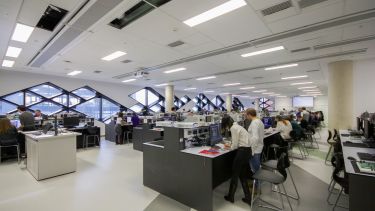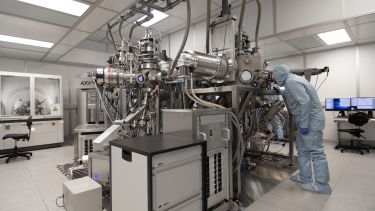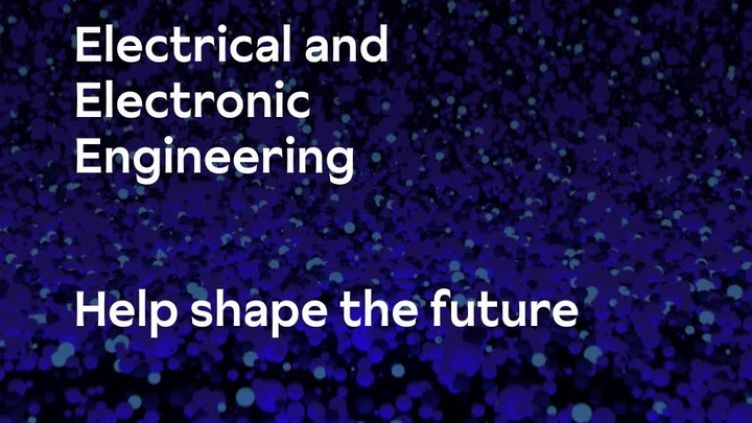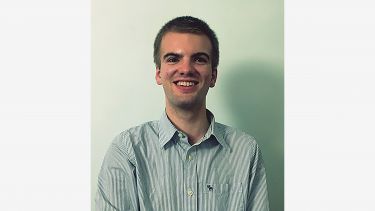Electrical and Electronic Engineering with a Foundation Year BEng MEng
2024-25 entryExplore power systems, power electronics, digital electronics, circuits and devices, electrical machines and drives. Your study covers theoretical and practical aspects across the range of electronic and electrical engineering. Once you’ve successfully completed the foundation year, which has modules in mathematics, physics and chemistry, you can start your main degree.
Key details
- A Levels BBB; BBC
Other entry requirements - UCAS code H602
- 5 years / Full-time
- September start
- Accredited
- Find out the course fee
- FY Foundation year
- Industry placement
Explore this course:
Course description

If you don't have the usual scientific or mathematical background for an engineering degree, a foundation year is for you. After successfully completing the foundation year, which has modules in mathematics, physics and chemistry, you can start the MEng or BEng degree.
Learn about power systems, power electronics, digital electronics, circuits and devices, electrical machines and drives. Your study will cover theoretical and practical aspects across the range of electronic and electrical engineering. You'll choose optional modules from an extensive range covering many aspects of electrical and electronic engineering and communications, depending on your interests.
All our first-year students take part in the faculty's Global Engineering Challenge, working with students from other engineering disciplines to solve a real-world problem. All second years get to work on a week-long project devised by one of our industry partners. You'll also get the chance to work with an engineering company through the Sheffield Industrial Project Scheme.
In your third year you'll carry out your own research project, supervised by an academic. In your final year, you will work as part of a multidisciplinary team on a research project led by an academic with industry input.
Accredited by the Institution of Engineering and Technology on behalf of the Engineering Council for the purposes of fully meeting the academic requirement for registration as a Chartered Engineer.
Modules
UCAS code: H602
Years: 2022, 2023
Core modules:
- Core Foundation Mathematics
-
The syllabus for MAS003 covers the common core A Level curriculum. The unit is tailored for students who have been away from mathematics for a period of time, but who will have gained some A-Level or similar qualifications. The unit covers the basic principles of algebra, geometry and calculus. Following the introduction of new material in the lectures, students have the opportunity of extensive problem solving, both in the tutorial sessions with the lecturers and in their own time.
40 credits - Introduction to Engineering
-
This module will introduce the application of engineering principles to foundation year students and give the student an appreciation of the breadth of engineering activities across the faculty and identify to students what knowledge areas and skills are needed in order to contribute to their development and be successful. It will also help create links with departments and draw on the other modules that students will take in the foundation year especially maths and physics.
40 credits - Further Foundation Mathematics
-
The syllabus for MAS004 covers important material which appears on the A level maths and further mathematics A Level curriculum. The module is for students who are taking MAS003 and need a deeper background in mathematics for their degree course. The module covers advanced principles of algebra, geometry and calculus. Following the introduction of new material, students have the opportunity of extensive problem solving, both in the problem classes with tutors and in their own time.
10 credits - Foundations of Physics
-
PHY009 provides students with the foundations of Physics required to enter the first year of a regular Physics or other scientific degree course, or an engineering course where detailed knowledge of Physics is needed.
30 credits
Understanding will be developed in 3 lectures per week over a full academic year. Problem solving and example classes are integrated into lectures. The following topics will be covered: Dynamics/Mechanics; Electricity and Magnetism; Thermal Physics; Oscillations, Waves, and Optics; Properties of Matter; Atomic and Nuclear Physics.
As PHY009 teaches no practical Physics, this module is complemented by the 10 credit laboratory module FCE002 for most science foundation year students (except for foundation year students leading to a Mathematics undergraduate programme) or FCE001 for engineering foundation year students.
The greatest advances in technology have taken place in the last hundred years. In 1897 few would have imagined that the probing of materials at the atomic level would reveal so much. These early discoveries of atomic constituents and their structure would pave the way for semi-conductor electronics, develop key concepts in physical laws, and offer a replacement energy source for fossil fuels in the form of nuclear power. This course summarises key discoveries in early particle physics and combines historical background with the detailed physics understanding needed to fully appreciate the subject.
These full modules aim to provide a sound foundation in Physics in preparation for Level 1 Physics modules. It introduces (i) Properties of Matter, (ii) Oscillations, waves & optics and (iii) Atomic and Nuclear Physics. (i) Properties of Matter discusses structural, mechanical and electrical properties in terms of simple models. (ii) treats vibration and waves introducing the concepts of wavelength, frequency and wave speed. (iii) discusses the physics of the atom, including historical aspects, the electron, the photo-electric effect, Bohr¿s atomic model, nuclear structure and radioactivity. - Foundations of Physics with Computing
-
This module will introduce essential concepts in mechanics and electronics in the context of computer science, to develop an understanding of real world interactions with electro-mechanical devices and producing simplified programming code.
30 credits
- Foundation Core and Enhanced Mathematics
-
This module builds on the common core curriculum from A level maths (which is a prerequisite). This unit covers enhanced comprehension of topics in pure maths, statistics, probability, and numerical methods. These topics are chosen to further prepare students for their undergraduate studies in the science and engineering faculties.
40 credits
After successfully completing the foundation year, you can start your BEng or MEng degree.
Explore electronic and electrical engineering courses
The content of our courses is reviewed annually to make sure it's up-to-date and relevant. Individual modules are occasionally updated or withdrawn. This is in response to discoveries through our world-leading research; funding changes; professional accreditation requirements; student or employer feedback; outcomes of reviews; and variations in staff or student numbers. In the event of any change we'll consult and inform students in good time and take reasonable steps to minimise disruption.
Learning and assessment
Learning
Learning will be delivered through a combination of lectures, practical labs and tutorials as well as independent study that is supported by problem classes.
In your first and second year all your labs will be held in the Diamond where you will use industry grade equipment and have lab sessions in the dedicated teaching clean room.
In your third year you will carry out your own research project, supervised by an academic. In your final year, you will work as part of a multidisciplinary team on a research project led by an academic with industry input.
Our teaching is informed by the research that our department is involved with. This results in learning by a combination of theory and hands on practical lab sessions in our state of the art facilities with courses that are accredited by the Institute of Engineering and Technology (IET).
Assessment
You will be assessed using a mixture of exams/tests, coursework and practical sessions.
Programme specification
This tells you the aims and learning outcomes of this course and how these will be achieved and assessed.
Entry requirements
The A Level entry requirements for this course are:
BBB; BBC
BBB (any A Level); BBC, including Maths and at least one of Physics, Chemistry or Biology
- International Baccalaureate
- 32 (any subjects); 31, with Maths and at least one of Physics, Chemistry or Biology at Higher Level 5 or Standard Level 7
- BTEC Extended Diploma
- DDD in Engineering or Applied Science + GCSE Science grade 6/B and Maths grade 7/A
- BTEC Diploma
- DD in Engineering or Applied Science + A at A Level (no STEM at A Level) + GCSE Science grade 6/B and Maths grade 7/A; DD in Engineering or Applied Science + B in an A Level science subject (Physics, Chemistry, or Biology) + GCSE Maths grade 7/A; DD in Engineering or Applied Science + C in A Level Maths + GCSE Science grade 6/B
- Scottish Highers
- AABBB (any subjects); ABBBB, including Maths and at least one of Physics, Chemistry or Biology
- Welsh Baccalaureate + 2 A Levels
- B + BB (any A Levels); B + BC in Maths and either Physics, Chemistry or Biology
- Access to HE Diploma
- Award of Access to HE Diploma in a relevant subject, with 45 credits at Level 3, including 24 at Distinction (to include 12 Maths units), and 21 at Merit + GCSE Maths grade 7/A
-
If you are studying both Maths and a science (Physics, Chemistry or Biology) at A Level or equivalent, there are no additional GCSE requirements. If you are studying any other subject combination, we require GCSE science grade 6/B and Maths grade 7/A
You must demonstrate that your English is good enough for you to successfully complete your course. For this course we require: GCSE English Language at grade 4/C; IELTS grade of 6.5 with a minimum of 6.0 in each component; or an alternative acceptable English language qualification
Equivalent English language qualifications
Visa and immigration requirements
Other qualifications | UK and EU/international
If you have any questions about entry requirements, please contact the department.
Graduate careers
Department of Electronic and Electrical Engineering
Typical graduate job titles include cybersecurity consultant, design engineer, energy engineering consultant, system engineer, electrical engineer, technology analyst, nuclear controls engineer, software engineer and electronics field engineer.
Employers of graduates include ARM, ARUP, BAE Systems, Barclays, Deloitte, Jaguar, Nissan, National Grid, National Instruments, Renault, Rolls Royce, Shell, Siemens, Unilever and Volvo.
Department of Electronic and Electrical Engineering

We have been at the forefront of research and teaching within the field of electronic and electrical engineering for over a century. In that time the use of electronics has become mainstream requiring challenges to be overcome to provide solutions for everyday needs.
Our students learn from academic experts who have strong links with partners in industry. Our state-of-the-art laboratories allow you to get hands on with equipment used in industry as preparation for your career.
Our wide range of MEng and BEng undergraduate degree programmes provide you with a robust understanding of the principles of electronic and electrical engineering. We offer a common start to all our degrees which offers you the flexibility to change courses at the end of your first year if you wish to focus on certain areas of interest.
All of first year students take part in the faculty's Global Engineering Challenge, working with students from other engineering disciplines to solve a real-world problem. In your third year, you will work on your own research project supervised by an academic.
All our courses are accredited by the Institution of Engineering and Technology. A four-year MEng meets all the academic standards for Chartered Engineer (CEng) status. If you take our three-year BEng, you'll need to complete some further learning to satisfy the requirements.
Science and Engineering Foundation YearWhy choose Sheffield?
The University of Sheffield
Number one in the Russell Group
National Student Survey 2023 (based on aggregate responses)
92 per cent of our research is rated as world-leading or internationally excellent
Research Excellence Framework 2021
Top 50 in the most international universities rankings
Times Higher Education World University Rankings 2023
Number one Students' Union in the UK
Whatuni Student Choice Awards 2023, 2022, 2020, 2019, 2018, 2017
Number one for teaching quality, Students' Union and clubs/societies
StudentCrowd 2023 University Awards
A top 20 university targeted by employers
The Graduate Market in 2023, High Fliers report
Department of Electronic and Electrical Engineering
QS World University Rankings 2021
Fees and funding
Fees
Additional costs
The annual fee for your course includes a number of items in addition to your tuition. If an item or activity is classed as a compulsory element for your course, it will normally be included in your tuition fee. There are also other costs which you may need to consider.
Funding your study
Depending on your circumstances, you may qualify for a bursary, scholarship or loan to help fund your study and enhance your learning experience.
Use our Student Funding Calculator to work out what you’re eligible for.
Further information
Industrial experience
Second-year students have the chance to work on real industrial problems through the pioneering Sheffield Industrial Project Scheme. You can apply your knowledge to engineering problems at level three with a major project in direct collaboration with an academic supervisor from one of our research groups. An industrial placement, either during the vacation or as a year out, will complement your studies. The University's Careers Service can advise you how to find these, or you may have an arrangement with a sponsor.
Sponsorship
Many of our undergraduates are sponsored in some way, often by their employers. We can arrange either deferred entry or a year out during the course if required.
Visit
University open days
We host five open days each year, usually in June, July, September, October and November. You can talk to staff and students, tour the campus and see inside the accommodation.
Subject tasters
If you’re considering your post-16 options, our interactive subject tasters are for you. There are a wide range of subjects to choose from and you can attend sessions online or on campus.
Offer holder days
If you've received an offer to study with us, we'll invite you to one of our offer holder days, which take place between February and April. These open days have a strong department focus and give you the chance to really explore student life here, even if you've visited us before.
Campus tours
Our weekly guided tours show you what Sheffield has to offer - both on campus and beyond. You can extend your visit with tours of our city, accommodation or sport facilities.
Apply
Contact us
- Telephone
- +44 114 222 7870
- sefy@sheffield.ac.uk
The awarding body for this course is the University of Sheffield.
Recognition of professional qualifications: from 1 January 2021, in order to have any UK professional qualifications recognised for work in an EU country across a number of regulated and other professions you need to apply to the host country for recognition. Read information from the UK government and the EU Regulated Professions Database.
Any supervisors and research areas listed are indicative and may change before the start of the course.



